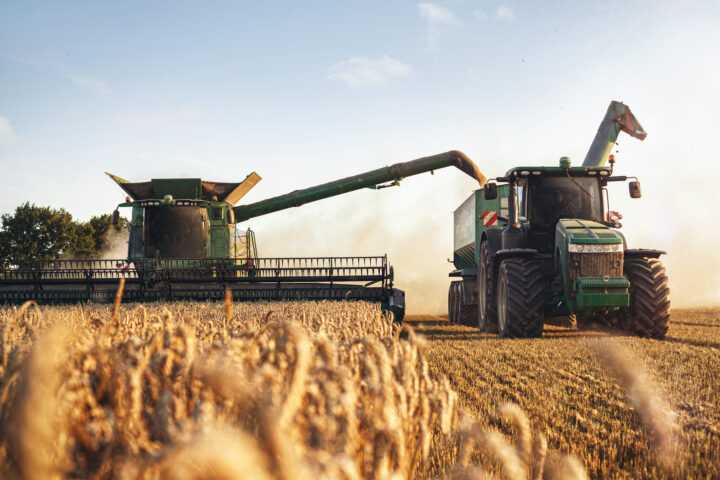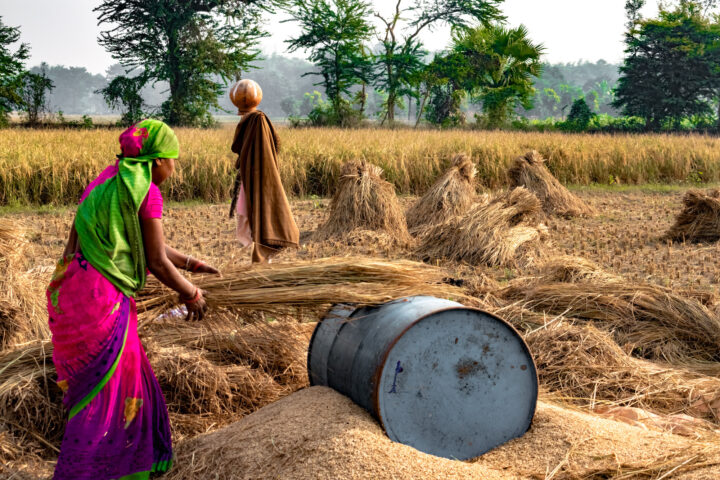
A war over food
400 million people worldwide are supplied with grain from Ukraine, many of them in North Africa and the Middle East. The UN's Food and Agriculture Organization (FAO) is sounding the alarm. Meanwhile, European politicians are not yet acting as if security of supply and global food security are priorities. The SRF program International gives an insight into the difficulties that the war in Ukraine brings to the world's food supply - and it suggests possible solutions.
Wednesday, July 6, 2022
Ukraine produced 86 million tons of grain in 2021. Most of it was traded globally and helped feed 400 million people, mostly in North African and Middle Eastern countries. This year, however, the harvest will be more than 30 million tons lower. Such huge quantities cannot simply be procured elsewhere quickly.
Interrupted shipping in the Black Sea
Compared to Switzerland, Ukraine has a gigantic agriculture. It still contributed 10% to national GDP in 2021. Kees Huizinga exemplifies the country's productive and export-oriented agriculture. The Dutchman has been a farmer in the Ukraine for 20 years and runs a leasehold farm with 15,000 hectares. That is more than 700 times that of an average Swiss farm (21.15 ha per farm on average in 2020, FSO). Like all companies in the Ukraine, the large company also suffers from high prices and supply challenges. Moreover, the huge quantities of grain that his company produces cannot simply be stored now that exports by cargo ship via the Black Sea ports are blocked. Trucks can transport only a fraction of the amount. This is a logistical problem for which there is currently no solution. Accordingly, Hunzinga can still harvest for the time being, but can no longer sell everything. In the long term, his business cannot continue to exist under these conditions. This is because from the sales of the crops, he in turn finances fuel, seeds and crop protection. Huizinga is worried about the crisis at his farm and in Ukrainian agriculture; he worries for humanitarian reasons as well. His wish is to continue producing and to be able to sell the products.
Simplify trade and transport
Jakob Kern from the UN's World Food Program agrees that logistics is the most pressing problem for Ukrainian agriculture and world food security. He describes how trucks must stand at the EU's external border for days before agricultural goods can be transported across the border. Although he does not express criticism openly, questions are raised: Why is the European Union restricting trade in agricultural goods so severely? Why can't the customs clearance of imports be handled more expeditiously? Wouldn't an open agricultural market be better for Ukraine and for world food security? In any case, there are short-term plans to simplify logistics with additional storage capacity at the border: Simple steel silos could be built in a matter of weeks for temporary grain storage at the Polish border. This could create urgently needed buffer capacities until the transport companies can increase the volumes.
Crop shortfall for the following years as well
Another peculiarity of agriculture is that a lost harvest season never comes back. Three crops have already been affected by the war in Ukraine, as Huizinga impressively describes.
The 2021 harvest is still partially stored in silos and cannot be exported now. The harvest of 2022 is affected because the start of the war meant that sowing could not take place, in part because agricultural land was occupied or mined and because fertilizer and inputs are less available. Ultimately, the 2023 harvest will not be able to take place in some places because farms cannot transport and sell their harvest and ultimately have no more money to invest.
The war in Ukraine is therefore also a war over food. According to Pierre Vauthier of the United Nations World Food Program (WFP), an additional 47 million people worldwide are at risk of starvation. The situation is exacerbated by droughts in India, China and parts of Europe, such as in northern Italy. And the increase in the price of wheat has an impact on the price of other staple foods such as millet, as demand increases. This is devastating for the world's poorest.
Dutch-Ukrainian farmer Hunzinga criticizes European politics: Food is different from mobile phones and cars: “Just a month without it and you're dead”, the politicians don't understand this special position of agriculture.
Reconstruction is planned in Lugano
Against this agricultural starting point, the first reconstruction conference for Ukraine will take place on July 4 and 5, 2022 in Lugano. In view of the challenges, the aim must be to ensure that agricultural production in Ukraine is secured and that farms can sell their products on the world market. Josef Schmidhuber, Deputy Head of Markets and Trade at the FAO in Rome, explains the problem. One has to consider that agriculture is also credit-financed: “If farmers cannot sell their harvests now and cannot get any new credit for the next year, nor receive any advance payments such as diesel oil and seeds, pesticides, plant protection products, etc., then it can also be the case that production will collapse again”. Then the effects would be even more drastic than before, not only for Ukraine, but also for the world markets.
The dimensions of Ukrainian agriculture are difficult to imagine in little Switzerland. Yet in Lugano it must be possible to think big and find solutions for a globally networked agriculture and food industry. Governments and the private sector must work hand in hand. This serves both the export-oriented agriculture of Ukraine and the world's food supply.
Related articles

Production: More food with fewer resources
One of the greatest challenges of this century will be to feed an estimated ten billion people in a safe and sustainable manner. To achieve this goal, agriculture needs to become much more productive.

Wheat production: Heat wave in India exacerbates global supply situation
South Asia is currently being hit by an exceptional heat wave. This is threatening the harvests of many farmers. India has therefore imposed an export ban on wheat. The country is the second largest producer of wheat in the world. This is likely to exacerbate the already tense situation on the agricultural markets caused by the war in Ukraine.

How our daily lives end up in the water
When residues in our waters are discussed, agriculture is often portrayed as the main culprit. Yet a closer look shows that the sources are diverse and often much closer to everyday life than assumed.

New Breeding Methods at a Crossroads
It will soon become clear whether plants developed through modern genomic breeding techniques will be allowed to be cultivated in European fields in the future. Switzerland in particular would be well advised to at least keep an eye on decisions made in Brussels in order not to fall behind.

Why Strict GMO Regulation Stifles Innovation
New breeding techniques such as CRISPR-Cas are considered key to developing resilient crops, stable yields and reducing the need for plant protection products. ETH professor Bruno Studer warns that overregulating these technologies strengthens precisely those large agricultural corporations that critics seek to curb, while excluding smaller breeders and start-ups from the market.

A Superfood with Benefits and Challenges
Sweet lupin is Biovision’s “Superfood of the Year 2026.” It delivers high protein content, improves soils and supports biodiversity. Yet a closer look at agricultural practice shows that without breeding, crop protection and innovation, even this superfood remains a challenging crop.

